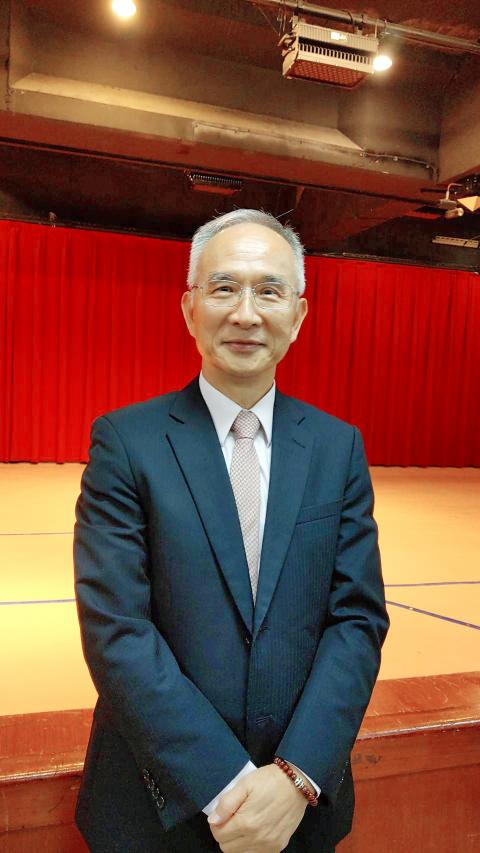Asia Pacific Telecom Co (APT, 亞太電信) yesterday said that it was gearing up for the 5G spectrum auction in December and is seeking capital to fund its 5G network deployment.
The company has obtained a syndicated loan of NT$7 billion (US$223.29 million) for 5G spectrum acquisition, in addition to a license to offer applications over the high-speed wireless network, chairman Lu Fang-ming (呂芳銘) said in response to a shareholder’s question at the firm’s annual general meeting in Taipei.
The shareholder was concerned that since APT was still making losses and paying hefty depreciation and amortization costs, the 5G investment would add another financial burden.

Photo: Wang I-hung, Taipei Times
APT “will definitely bid” for 5G bandwidth during the first round, Lu said.
Winning 5G bandwidth is a must for the company to play a role in the nation’s telecom industry, even though the bidding would be highly competitive, as only 2,709 megahertz (MHz) are on offer, he said.
The firm would risk losing its competitive edge if it does not also launch 5G services, he said.
APT is arranging another syndicated loan and preparing for the issuance of new shares to finance its 5G deployment, Lu said, declining to specify how much it would need.
The company has so far installed 20,000 small cell stations, which would be upgraded to support 5G in densely populated urban areas, Lu said.
APT has gone one step further in its 5G efforts by completing a data fiber-optical deployment nationwide to deliver data on fixed and wireless networks, he said.
The company would have a chance to get a 50MHz spectrum if bidders are restricted to 60MHz rather than 100MHz as widely speculated, Lu told reporters.
However, the National Communications Commission in the afternoon announced that the maximum range would be 100MHz, as it is considered sufficient to deliver a 5G network.
APT said that it started eking out earnings before interest, taxes, depreciation and amortization in the past five months, which it expects to remain positive throughout next year.
It would take longer to begin turning a net profit, as the company still has to pay NT$4 billion per year in depreciation and amortization costs for its 4G license and equipment, it said.
APT has more than 2 million mobile subscribers.
The company last year narrowed its losses to NT$3.29 billion, from NT$4.07 billion in 2017.

To many, Tatu City on the outskirts of Nairobi looks like a success. The first city entirely built by a private company to be operational in east Africa, with about 25,000 people living and working there, it accounts for about two-thirds of all foreign investment in Kenya. Its low-tax status has attracted more than 100 businesses including Heineken, coffee brand Dormans, and the biggest call-center and cold-chain transport firms in the region. However, to some local politicians, Tatu City has looked more like a target for extortion. A parade of governors have demanded land worth millions of dollars in exchange

An Indonesian animated movie is smashing regional box office records and could be set for wider success as it prepares to open beyond the Southeast Asian archipelago’s silver screens. Jumbo — a film based on the adventures of main character, Don, a large orphaned Indonesian boy facing bullying at school — last month became the highest-grossing Southeast Asian animated film, raking in more than US$8 million. Released at the end of March to coincide with the Eid holidays after the Islamic fasting month of Ramadan, the movie has hit 8 million ticket sales, the third-highest in Indonesian cinema history, Film

Taiwan Semiconductor Manufacturing Co’s (TSMC, 台積電) revenue jumped 48 percent last month, underscoring how electronics firms scrambled to acquire essential components before global tariffs took effect. The main chipmaker for Apple Inc and Nvidia Corp reported monthly sales of NT$349.6 billion (US$11.6 billion). That compares with the average analysts’ estimate for a 38 percent rise in second-quarter revenue. US President Donald Trump’s trade war is prompting economists to retool GDP forecasts worldwide, casting doubt over the outlook for everything from iPhone demand to computing and datacenter construction. However, TSMC — a barometer for global tech spending given its central role in the

Alchip Technologies Ltd (世芯), an application-specific integrated circuit (ASIC) designer specializing in server chips, expects revenue to decline this year due to sagging demand for 5-nanometer artificial intelligence (AI) chips from a North America-based major customer, a company executive said yesterday. That would be the first contraction in revenue for Alchip as it has been enjoying strong revenue growth over the past few years, benefiting from cloud-service providers’ moves to reduce dependence on Nvidia Corp’s expensive AI chips by building their own AI accelerator by outsourcing chip design. The 5-nanometer chip was supposed to be a new growth engine as the lifecycle